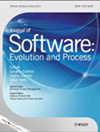“Eco-Friendly” Micro-Services: Resource Footprint of Cloud-Native Micro-Services Written in Java—A Balance Between Build-Time and Run-Time Effects of Releases
Abstract
The usage of micro-services in IT services is increasing. As this growth continues, the importance of eco-friendly design and operation becomes a significant factor. This study aims to evaluates the potential of Java frameworks that facilitate cloud-native micro-services in reducing the energy footprint throughout the release lifecycle. The release lifecycle view also looks into the development phase and its footprint impact respectively potentials to build overall more energy footprint optimized releases. Technology-driven methods and tools based on micro-service frameworks can help reduce the energy footprint at the micro-service level. However, local optimizations at the micro-service level cannot diminish the importance of more holistic approaches, such as optimizing the overall system, architecture and design of micro-services. The concepts derived from this analysis can be implemented in industrial settings, as presented by the case study. The effects are measurable and represent a positive step towards more eco-friendly cloud-native micro-service-based IT service offerings.

 求助内容:
求助内容: 应助结果提醒方式:
应助结果提醒方式:


